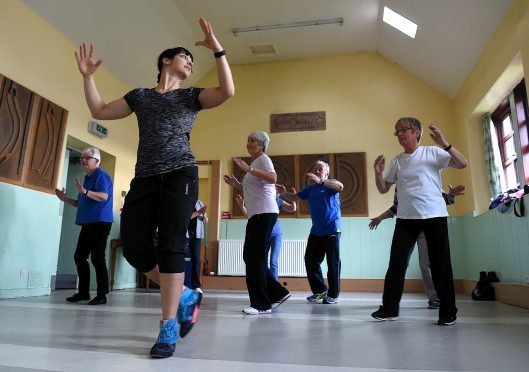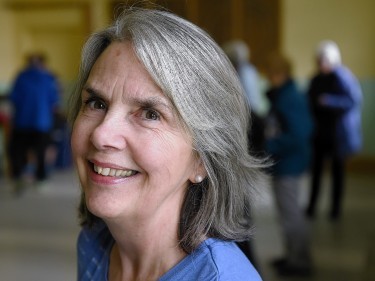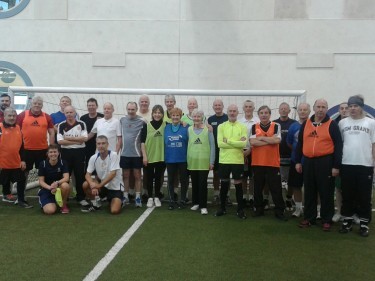This week, it has been revealed that those living in the north and north-east will enjoy healthy lives for longer than those living elsewhere. On day one of a new series looking at how we treat older people,
Susan Welsh looks at two inspiring ways of keeping old age at bay
There’s a television advert for a well-known spectacle company that shows an energetic young Zumba instructor shaking what her mother gave her while a group of elderly people look on, somewhat bewildered.
Swing by Saltburn Community Centre near Invergordon on Friday mornings, or several nursing homes in Ross-shire, such as Mull Hall Care Home in Barbaraville, and you may have to do a double take as, instead of looking confused, you’ll find a similar group of older people, but they’re fully embracing Zumba – and loving it.
The members are a fantastic example of how some people are enjoying a ripe, active old age. And they’re not alone. Earlier this week, new figures from the Scottish Government revealed that those living in the north and north-east will enjoy healthy lives for longer than those living elsewhere.
In this series, we’ll be covering a variety of topics which affect the older population, such as looking at the changing face of care homes, how much caring for an ageing population costs taxpayers, and how the new living wage will affect care homes. There are also features on combating loneliness, what life is like for care workers, palliative care and how you can reach out from beyond the grave to send a message to loved ones.
Statistics show that, on average, those living in island communities, as well as the north-east, will reach their 70s before they are likely to suffer failing health. Orkney has the greatest healthy life expectancy in the country, according to the Scottish Government, with the average person now likely to live to 70 before suffering serious illness while those living in Shetland, the Highlands and the north-east are likely to enjoy a healthy life until their late 60s, according to the statistics.
The Scottish Government figures also show that general life expectancy across the region is high, with people in north and north-east Scotland living on average until they are 80. That means people in the north and north-east would suffer about 11 years of being “not healthy” – far fewer than the Scottish average of 15 unhealthy years.
Jamie Hepburn, minister for sport, health improvement and mental health, said: “Scotland’s health is improving, with people living longer, healthier lives. It is encouraging to see that healthy life expectancy has increased since last year. We are also seeing a gradual reduction in the gap between males and females. Healthy life expectancy is increasing for both sexes, but at a faster rate for men.”
One of those making sure that older people stay active is the Invergordon Zumba instructor Natallia Maguire, who is from Belarus originally. She moved to Scotland in 2004 and was the first Zumba instructor in the Highlands. Among the classes she offers are Zumba Gold and Zumba Chair, both aimed at men and women aged over 65.
“It’s incredibly important for older people to keep moving,” said Natallia, whose hour-long class at the Saltburn Centre attracts at least a dozen seniors, some of whom are in their 70s, each week.
“Zumba Gold recreates original Zumba choreography moves that focuses on balance, motion and co-ordination, but does it at a lower intensity level. With Zumba Chair, clients sit in a chair and move their arms and legs. They do this to music that is familiar to them, so it’s not confusing, but we also play new music, too.
“Feedback from the nursing homes has shown that staff there have seen an improvement in fitness levels. So, for example, some who first began the classes sitting, are now able to stand up and use resistance bands.”
“At the centre classes, there’s no jumping around, so you won’t burn 900 calories, but you will get fitter. Most of those who attend the classes love dancing and enjoy other activities such as swimming, table tennis and golf.”
Although Father Time may be creeping up on you, Natallia feels strongly that older people should not just sit at home. “The classes are very sociable and, as a result, have become something of a little fitness family, where friendships have been formed. There’s a great community spirit which has
extended to include organised party classes, fun events and even nights out.”
VOX POP
“Natallia is a great instructor and Zumba is a great way to keep fit at my age.” James Thomson, 72, from Mossfield Road, Invergordon
“I have been attending Natallia’s classes for quite a number of years now and thoroughly enjoy them. She is a super teacher, very enthusiastic and inspiring. The class is fun and inspires the feeling of friendship and enjoyment.” Meg Bannerman, 68, from Lamington
GETTING BACK TO THE BEAUTIFUL GAME
Each week, thousands of men think nothing of pulling on a pair of football boots and going for a kickabout. Playing the beautiful game with your friends is one of life’s little pleasures: the feeling of euphoria when you score a goal or win a game is difficult to replicate anywhere else.
But what happens when you get older? The spirit may be willing, but the body, well, it may take a different view. Despite our best efforts, age comes to us all and, for some, a game of football is just too much to handle.
However, a solution has been found to help people get back on to the football pitch or experience the beautiful game for the first time: Walking Football, which is a slower version of the game that can help improve the health of older people.
Having been invented six years ago, the game is still very much in its infancy. But if all goes well, it could become a recognised national sport, and if Gavin Smith, NHS Highland community health coordinator, has his way, there may even be a Walking Football Highland League in the not too distant future.
Part of Gavin’s remit is working with older men: “They can be something of an invisible group. They are all there, but tend not be as involved in local or community groups as much as women are,” said Gavin.
“The message to them is: don’t sit in the house alone, but get involved as there’s everything from a Men’s Shed group which has workshops for men over 50 where they can help mend or build things to the Walking Football group.
“There’s a Walking Football Association in Scotland and the Scottish Football Association has an initiative which links clubs with their local communities. In our case, we’re linked with Ross County and Caley Thistle.
“The rules are basically the same, except you’re not allowed to run. If both heels come off the ground, it’s a free kick. I had in my head that it would be a slow game, but it’s actually quite fast because, as you’re not allowed to run with the ball, you have to pass it more, so it’s actually quite fast moving. I’ve played it a few times and it’s much harder than it looks. Once players get the hang of the game it can be pretty fast and you certainly feel your muscles working.”
The 90-minute football sessions are mainly targeted towards older men who are not regular gym-goers or who enjoy an active social life but perhaps tend not to engage with community groups and, without realising it, can be quite socially isolated.
“We want to attract people who perhaps haven’t exercised for years or don’t normally do any other type of exercise and who don’t regularly attend other events, but all are welcome to come and try the sport,” said Gavin.
In Ross-shire, regular sessions take place at the Highland Football Academy at Ross County’s ground, while Caley Thistle coaches and players run regular sessions at the Hilton Community Centre in Inverness. Sport Aberdeen has set up a Walking Football project in conjunction with AFC in the Community at Torry Sports Centre and, since being introduced in Moray earlier this year, Walking Football has proved really popular in Elgin and Buckie.
This week, two teams from Elgin took part in a tournament at Aberdeen Sports Village organised by Aberdeen Football Club Community Trust. Kim Paterson, sports development officer with Moray Council, said: “This was an opportunity to bring groups together and have a series of games across a two-hour period. The Elgin group, most of whom were aged over 60, thoroughly enjoyed it, although there were a few comments on the way home that some of the Aberdeen contingent were running instead of walking.”
Gavin said: “The game might be played at a slower pace, but players will still receive all the health benefits of playing regular football. Increased endurance, stronger muscles and better balance can help to decrease the chances of having a fall, which can be life-changing for many older people. It can also help you to build a new group of friends and help challenge social isolation. This can have as big an impact on your health as any physical illness, so it’s vitally important to stay active in the community and build a strong network of friends.
“Sport is a wonderful way to meet new people, and playing in a team sport encourages communication and teamwork. For some people, playing football brings back some wonderful memories, and we hope we can help them relive those moments.”
While still a relatively new sport, the game is catching on and there’s now more than 225 registered clubs across the UK. Last year, Age Scotland held a tournament for the first time.
“We’re hoping to put together a team to take part next year,” said Gavin.
“In the longer run, I’m looking to put in a funding application to see if we can roll it out to different areas, while High Life Highland is looking to see if it can introduce the sport at some of its centres.
“It’s early doors for all of us, but the plan is to get two or three teams up and running and the eventual aim would be to have our own Highland League.”
For more information on Walking Football in the Highlands, contact Gavin Smith on 01349 852496. For details of Walking Football groups elsewhere in the north, visit: www.walkingfootballunited.co.uk


